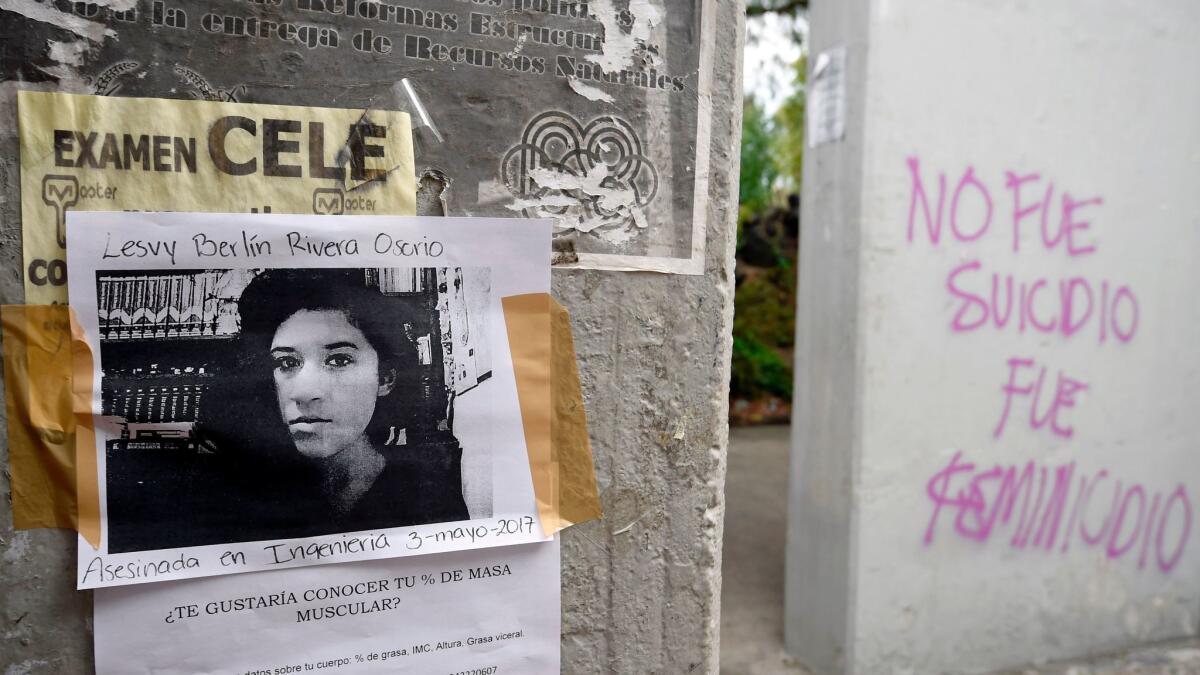Mexican officials enrage women by suggesting a young victim’s lifestyle was responsible for her violent death
- Share via
Mexico City — In life, Lesby Berlin Osorio was a young woman who doted on her dog and was preparing to return to her university studies, her mother told reporters.
In death, however, “Lesby,” as she is referred to by the Mexican media, has become a vivid symbol of what critics call a reprehensible tendency among Mexican authorities to blame women’s personal behavior for violence inflicted on them.
An intense social media backlash here has seen thousands of women and others — using the hashtag, #SiMeMatan (“If They Kill Me”) — reject prosecutors’ comments insinuating that the woman’s lifestyle contributed to her violent death.
The body of Berlin, 22, was discovered early Thursday next to a telephone booth on the sprawling campus of the National Autonomous University of Mexico, authorities said. She had a telephone cable tied around her neck, according to the city prosecutor’s office.

Mexican police have yet to publicly disclose the cause of death and whether it was believed to have been a homicide or suicide.
But in the wake of the grisly discovery, prosecutors released a series of messages via Twitter that many objected to as disparaging the woman.
In one message, the Mexico City prosecutor’s office said that Berlin and her boyfriend had been “drinking and [taking] drugs” before she died. Another quoted her boyfriend saying she had quit her studies in 2014.
Based on those comments, some initial Mexican media accounts tended to focus on the woman’s lifestyle rather than her death. She was portrayed as a college dropout with a drinking and substance-abuse problem who lived with her boyfriend and earned a marginal living as a dog walker.
The negative characterizations of the young woman triggered outrage in a nation where many have denounced a “pandemic” of unsolved killings of women, known as feminicidio, or femicide.
“If They Kill Me, hopefully the police (and the media) will focus on my murderer, not on my clothes, my studies, my work and whoever I am sleeping with,” said one tweet, signed Paola Villarreal.
Another Twitter user wrote: “If They Kill Me, they will say it is because I wore red lipstick, tried to be independent, occasionally drank and have male friends.”

An image circulated on social media listed various personal characteristics that might be used to blame women for their violent deaths. Among them: “lesbian,” “strange,” “drug-addict,” “poor,” “indigenous,” “prostitute,” “short skirt,” “had a boyfriend,” “didn’t attend high school.”
A number of men posted social media messages in solidarity, noting the divergent treatment of victims depending on their gender.
“If They Kill Me, and I’m drunk and alone on a dark street, they won’t call me guilty of my own murder because I am not a woman,” wrote Manuel Iris, a Mexican poet.
On Friday, thousands of protesters marched at the campus where the woman’s body was found, assailing the prosecutor’s handling of the case and demanding a thorough investigation.
“This wasn’t a suicide. It was a feminicidio!” chanted a group of protesting women. “We are all Lesby!”
The Mexico City prosecutor, Rodolfo Rios, said he ordered the “inappropriate” messages deleted from the office’s social media accounts.
“The behavior, private life or social status of a victim should never affect an investigation,” the prosecutor wrote.
The dead woman’s mother, Araceli Orozco, said her daughter in no way resembled the troubled young woman portrayed in the prosecutor’s communications.
“My daughter wasn’t an alcoholic, nor a drug addict, nor a dog-walker, like they made her out to be,” the mother told Proceso magazine.
Her daughter adored her dog, “Uncle Michael,” was preparing to return to university studies in French literature and international relations and lived near the university with her boyfriend, the mother said.
“That shouldn’t stigmatize her,” she added, referring to the couple’s living arrangements. “That doesn’t turn her into a contemptible person, like they would like to make her and other women out to be.”
Cecilia Sanchez of The Times’ Mexico City bureau contributed to this report.
twitter: @mcdneville
ALSO
Clashes between soldiers and gasoline smugglers leave 10 dead in Mexico
Mexican tourists don’t want to visit Trump’s America. It will cost us billions
What it’s like to report in one of the world’s deadliest places for journalists
More to Read
Sign up for Essential California
The most important California stories and recommendations in your inbox every morning.
You may occasionally receive promotional content from the Los Angeles Times.













